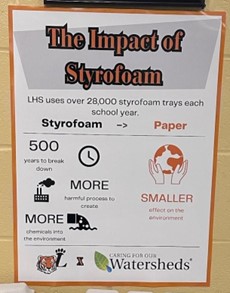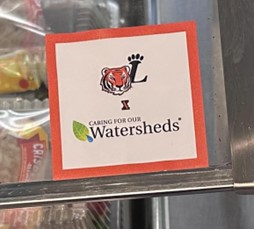2023, Loveland, Ohio, USA

“The Impact of Styrofoam” was created by students, Olivia, Wyatt, Sophia, and Jake, at Loveland High School. The project focuses on the switch from
styrofoam lunch trays to all paper products in the school’s cafeteria as well as the process of educating the students and staff on the harmful effects of styrofoam.
Styrofoam is estimated to take over 500 years to decompose and is known to leach chemicals into the environment, while on the other hand, paper only takes 2-6 weeks to fully decompose. While the paper trays have a much better impact on the environment, their project illuminated some interesting problems when used in a cafeteria setting. For example, on days where the
cafeteria serves spaghetti, the sauce tends to seep into the material and make the meal less appealing for the student; the styrofoam does not have this behavior. The styrofoam trays,
however, are less sturdy than the paper trays. This switch, while there are pros and cons to both sides, is important for the sake of the Little Miami River Watershed.
Their biggest takeaway from doing this project was the amount of thought and consideration that goes into making decisions, such as, the kind of tray students’ bought lunches come on.
Sustainable Development Goals this project hits:
- Goal 6: Clean Water and Sanitation.
- 6.3: By 2030, improve water quality by reducing pollution, eliminating dumping and minimizing release of hazardous chemicals and materials, halving the proportion of untreated wastewater and substantially increasing recycling and safe reuse globally.
- Goal 12: Responsible Production and Consumption.
- 12.6: Encourage companies, especially large and transnational companies, to
adopt sustainable practices and to integrate sustainability information into their reporting cycle.
- Goal 14: Life Below Water.
- 14.1: By 2025, prevent and significantly reduce marine pollution of all kinds, in particular from land-based activities, including marine debris and nutrient pollution.


